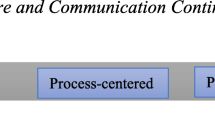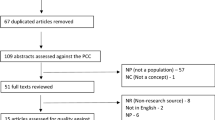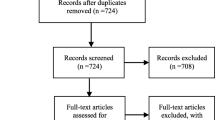Abstract
Learning to take safe and effective action in complex settings rife with uncertainty is essential for patient safety and quality care. Doing so is not easy for trainees, as they often consider certainty to be a necessary precursor for action and subsequently struggle in these settings. Understanding how skillful clinicians work comfortably when uncertain, therefore, offers an important opportunity to facilitate trainees’ clinical reasoning development. This critical review aims to define and elaborate the concept of ‘comfort with uncertainty’ in clinical settings by juxtaposing a variety of frameworks and theories in ways that generate more deliberate ways of thinking about, and researching, this phenomenon. We used Google Scholar to identify theoretical concepts and findings relevant to the topics of ‘uncertainty,’ ‘ambiguity,’ ‘comfort,’ and ‘confidence,’ and then used preliminary findings to pursue parallel searches within the social cognition, cognition, sociology, sociocultural, philosophy of medicine, and medical education literatures. We treat uncertainty as representing the lived experience of individuals, reflecting the lack of confidence one feels that he/she has an incomplete mental representation of a particular problem. Comfort, in contrast, references confidence in one’s capabilities to act (or not act) in a safe and effective manner given the situation. Clinicians’ ‘comfort with uncertainty’ is informed by a variety of perceptual, emotional, and situational cues, and is enabled through a combination of self-monitoring and forward planning. Potential implications of using ‘comfort with uncertainty’ as a framework for educational and research programs are explored.
Similar content being viewed by others
Notes
The word “experience” is used in the English language to represent the process of personally observing, encountering, or undergoing something as well as the knowledge or practical wisdom gained from what one has observed, encountered, or undergone. For the purposes of clarifying these two meanings, we will use ‘lived experience’ to describe experiences in the moment, and ‘accrued experience’ to represent the historical accumulation of such moments.
For Koriat, the term “experience-based cue” describes what we have been labeling as ‘lived experiences’ in the moment.
References
Atkinson, P. (1984). Training for certainty. Social Science and Medicine, 19, 949–956.
Babrow, A. S., Kasch, C. R., & Ford, L. A. (1998). The many meanings of uncertainty in illness: Toward a systematic accounting. Health Communcation, 10, 1–23.
Barbalet, J. M. (1993). Confidence: time and emotion in the sociology of action. Journal for the Theory of Social Behaviour, 23, 229–246.
Begg, I., Duft, S., Lalonde, P., Melnick, R., & Sanvito, J. (1989). Memory predictions are based on ease of processing. Journal of Memory and Language, 28, 610–632.
Bordage, G., & Lemieux, M. (1991). Semantic structures and diagnostic thinking of experts and novices. Academic Medicine, 66, S70–S72.
Bowen, J. L. (2006). Educational strategies to promote clinical diagnostic reasoning. New England Journal of Medicine, 355, 2217–2225.
Cassell, J. (1991). Expected miracles: Surgeons at work. Philadelphia: Temple University Press.
Chase, W. G., & Simon, H. A. (1973). The mind’s eye in chess. In W. G. Chase (Ed.), Visual information processing (pp. 215–281). New York: Academic Press.
Cooke, G., Tapley, A., Holliday, E., Morgan, S., Henderson, K., Ball, J., et al. (2017). Responses to clinical uncertainty in Australian general practice trainees: a cross-sectional analysis. Medical Education, 51, 1277–1288.
Cristancho, S. M., Apramian, T., Vanstone, M., Lingard, L., Ott, M., Forbes, T., et al. (2016). Thinking like an expert: surgical decision making as a cyclical process of being aware. American Journal of Surgery, 211, 64–69.
Cristancho, S. M., Apramian, T., Vanstone, M., Lingard, L., Ott, M., & Novick, R. J. (2013a). Understanding clinical uncertainty: What is going on when experienced surgeons are not sure what to do? Academic Medicine, 88, 1516–1521.
Cristancho, S. M., Vanstone, M., Lingard, L., LeBel, M. E., & Ott, M. (2013b). When surgeons face intraoperative challenges: A naturalistic model of surgical decision making. American Journal of Surgery, 205, 156–162.
Cristancho, S., Lingard, L., Forbes, T., Ott, M., & Novick, R. (2017). Putting the puzzle together: The role of ‘problem definition’ in complex clinical judgement. Medical Education, 51, 207–214.
Croskerry, P. (2003). The importance of cognitive errors in diagnosis and strategies to minimize them. Academic Medicine, 78, 775–780.
de Bruin, A., Dunlosky, J., & Cavalcanti, R. (2017). Monitoring and regulation of learning in medical education: The need for predictive cues. Medical Education, 51, 575–584.
Djulbegovic, B., Hozo, I., & Greenland, S. (2011). Uncertainty in clinical medicine. In F. Gifford (Ed.), Philosophy of medicine (pp. 299–356). Amsterdam: North Holland.
Dogra, N., Giordano, J., & France, N. (2007). Cultural diversity teaching and issues of uncertainty: the findings of a qualitative study. BMC Medical Education, 7, 1–13.
Dreiseitl, S., & Binder, M. (2005). Do physicians value decision support? A look at the effect of decision support systems on physician opinion. Artificial Intelligence in Medicine, 33, 25–30.
Dunphy, B. C., & Williamson, S. L. (2004). In pursuit of expertise. Toward an educational model for expertise development. Advances in Health Sciences Education, 9, 107–127.
Ericsson, K. A., Patel, V., & Kintsch, W. (2000). How experts’ adaptations to representative task demands account for the expertise effect in memory recall: Comment on Vicente and Wang (1998). Psychological Review, 107, 578–592.
Eva, K. W., & Regehr, G. (2005). Self-assessment in the health professions: A reformulation and research agenda. Academic Medicine, 80, S46–S54.
Eva, K. W., & Regehr, G. (2007). Knowing when to look it up: A new conception of self-assessment ability. Academic Medicine, 82, S81–84.
Fargason, C. A. J., Evans, H. H., Ashworth, C. S., & Capper, S. A. (1997). The importance of preparing medical students to manage different types of uncertainty. Academic Medicine, 72, 688–692.
Fox, R. (1957). Training for certainty. In R. K. Merton, G. Reader, & P. L. Kendall (Eds.), The student physician. Cambridge: Harvard University Press.
Friedman, C. P., Gatti, G. G., Franz, T. M., Murphy, G. C., Wolf, F. M., Heckerling, P. S., et al. (2005). Do physicians know when their diagnoses are correct? Implications for decision support and error reduction. Journal of General Internal Medicine, 20, 334–339.
Geller, G. (2013). Tolerance for ambiguity: An ethics-based criterion for medical student selection. Academic Medicine, 88, 581–584.
Grant, M. J., & Booth, A. (2009). A typology of reviews: an analysis of 14 review types and associated methodologies. Health Information and Libraries Journal, 26, 91–108.
Hartmann, W. H. (1998). Preparing medical students to “Manage Uncertainty”. Academic Medicine, 73, 116–117.
Ilgen, J. S., & Brydges, R. (2017). Cues for self-regulation: it’s difficult to make predictions, especially about the future. Medical Education, 51, 566–568.
Ilgen, J. S., Eva, K. W., & Regehr, G. (2016). What’s in a label? Is diagnosis the start or the end of clinical reasoning? Journal of General Internal Medicine, 31, 435–437.
Jha, S. (2014). Stop hunting for zebras in Texas: End the diagnostic culture of “Rule-Out”. BMJ: British Medical Journal, 348, g2625.
Jin, C. J., Martimianakis, M. A., Kitto, S., & Moulton, C. A. (2012). Pressures to “measure up” in surgery: Managing your image and managing your patient. Annals of Surgery, 256, 989–993.
Kennedy, T. J., Regehr, G., Baker, G. R., & Lingard, L. (2009a). Preserving professional credibility: Grounded theory study of medical trainees’ requests for clinical support. BMJ: British Medical Journal, 338, b128.
Kennedy, T. J., Regehr, G., Baker, G. R., & Lingard, L. A. (2009b). ‘It’s a cultural expectation…’ The pressure on medical trainees to work independently in clinical practice. Medical Education, 43, 645–653.
Kitchener, K. S. (1983). Cognition, metacognition, and epistemic cognition: a three-level model of cognitive processing. Human Development, 4, 222–232.
Koriat, A. (1997). Monitoring one’s own knowledge during study: A cue-utilization approach to judgments of learning. Journal of Experimental Psychology: General, 126, 349–370.
Koriat, A., Bjork, R. A., Sheffer, L., & Bar, S. K. (2005). Predicting one’s own forgetting: the role of experience-based and theory-based processes. Journal of Experimental Psychology: General, 133, 643–656.
Landefeld, C. S., Chren, M. M., Myers, A., Geller, R., Robbins, S., & Goldman, L. (1988). Diagnostic yield of the autopsy in a University hospital and a community hospital. New England Journal of Medicine, 318, 1249–1254.
Lazarus, R. S. (1991). Emotion and adaptation. New York: Oxford University Press.
Lazarus, R. S., & Folkman, S. (1984). Stress, appraisal, and coping. New York: Springer.
LeBlanc, V. R. (2009). The effects of acute stress on performance: implications for health professions education. Academic Medicine, 84, S25–33.
LeBlanc, V. R., McConnell, M. M., & Monteiro, S. D. (2015). Predictable chaos: a review of the effects of emotions on attention, memory and decision making. Advances in Health Sciences Education, 20, 265–282.
Leung, A., Luu, S., Regehr, G., Murnaghan, M. L., Gallinger, S., & Moulton, C. A. (2012). “First, do no Harm”: Balancing competing priorities in surgical practice. Academic Medicine, 87, 1368–1374.
Levine, D. N. (1985). The flight from ambiguity: Essays in social and cultural theory. Chicago: University of Chicago Press.
Light, D. (1979). Uncertainty and control in professional training. Journal of Health and Social Behavior, 20, 310–322.
Lingard, L., Garwood, K., Schryer, C. F., & Spafford, M. M. (2003). A certain art of uncertainty: case presentation and the development of professional identity. Social Science and Medicine, 56, 603–616.
Lipshitz, R., & Strauss, O. (1997). Coping with uncertainty: A naturalistic decision-making analysis. Organizational Behavior and Human Decision Processes, 69, 149–163.
Luther, V. P., & Crandall, S. J. (2011). Commentary: Ambiguity and uncertainty: Neglected elements of medical education Curricula? Academic Medicine, 86, 799–800.
Luu, S., Patel, P., St-Martin, L., Leung, A. S., Regehr, G., Murnaghan, M. L., et al. (2012). Waking up the next morning: surgeons’ emotional reactions to adverse events. Medical Education, 46, 1179–1188.
Mishel, M. H. (1988). Uncertainty in Illness. Image: The Journal of Nursing Scholarship, 20, 225–232.
Mishel, M. H. (1990). Reconceptualization of the uncertainty in illness theory. Image: The Journal of Nursing Scholarship, 22, 256–262.
Moulton, C. A., Regehr, G., Lingard, L., Merritt, C., & Macrae, H. (2010a). Operating from the other side of the table: control dynamics and the surgeon educator. Journal of the American College of Surgeons, 210, 79–86.
Moulton, C. A., Regehr, G., Lingard, L., Merritt, C., & MacRae, H. (2010b). Slowing down to stay out of trouble in the operating room: remaining attentive in automaticity. Academic Medicine, 85, 1571–1577.
Moulton, C. A., Regehr, G., Lingard, L., Merritt, C., & Macrae, H. (2010c). ‘Slowing down when you should’: Initiators and influences of the transition from the routine to the effortful. Journal of Gastrointestinal Surgery, 14, 1019–1026.
Novick, R. J., Lingard, L., & Cristancho, S. M. (2015). The call, the save, and the threat: Understanding expert help-seeking behavior during nonroutine operative scenarios. Journal of Surgical Education, 72, 302–309.
Ott, M., Schwartz, A., Goldszmidt, M., Bordage, G., & Lingard, L. (2018). Resident hesitation in the operating room: Does uncertainty equal incompetence? Medical Education, 52, 851–860.
Plebani, M. (1999). The clinical importance of laboratory reasoning. Clinica Chimica Acta, 280, 35–45.
Potchen, E. J. (2006). Measuring observer performance in chest radiology: some experiences. Journal of the American College of Radiology, 3, 423–432.
Rawson, K. A., & Dunlosky, J. (2002). Are performance predictions for text based on ease of processing? Journal of Experimental Psychology. Learning, Memory, and Cognition, 28, 69–80.
Reber, R., & Greifeneder, R. (2017). Processing fluency in education: How metacognitive feelings shape learning, belief formation, and affect. Educational Psychologist, 52, 84–103.
Rensink, R. A., O’Regan, J. K., & Clark, J. J. (1997). To see or not to see: The need for attention to perceive changes in sciences. Psychological Science, 8, 368–373.
Schön, D. A. (1983). The reflective practitioner: How professionals think in action. New York: Basic Books.
Schraw, G., Dunkle, M. E., & Bendixen, L. D. (1995). Cognitive processes in well-defined and ill-defined problem solving. Applied Cognitive Psychology, 9, 523–538.
Schwartz, S., & Griffin, T. (1986). Medical thinking: The psychology of medical judgment and decision making. New York: Springer.
Simons, D. J., & Chabris, C. F. (1999). Gorillas in our midst: sustained in attentional blindness for dynamic events. Perception, 28, 1059–1074.
Simpkin, A. L., & Schwartzstein, R. M. (2016). Tolerating uncertainty: The next medical revolution? New England Journal of Medicine, 375, 1713–1715.
Simpson, D. E., Dalgaard, K. A., & O’Brien, D. K. (1986). Student and faculty assumptions about the nature of uncertainty in medicine. Journal of Family Practice, 23, 468–472.
Smith, C. S., & Paauw, D. S. (2000). When you hear hoof beats: four principles for separating zebras from horses. Journal of the American Board of Family Practice, 13, 424–429.
Stewart, J. (2008). To call or not to call: A judgement of risk by pre-registration house officers. Medical Education, 42, 938–944.
Ten Cate, O., Hart, D., Ankel, F., Busari, J., Englander, R., Glasgow, N., et al. (2016). Entrustment decision making in clinical training. Academic Medicine, 91, 191–198.
White, G., & Williams, S. (2017). The certainty of uncertainty: Can we teach a constructive response? Medical Education, 51, 1200–1202.
Williams, R. G., Silverman, R., Schwind, C., Fortune, J. B., Sutyak, J., Horvath, K. D., et al. (2007). Surgeon information transfer and communication: Factors affecting quality and efficiency of inpatient care. Annals of Surgery, 245, 159–169.
Zilbert, N. R., Murnaghan, M. L., Gallinger, S., Regehr, G., & Moulton, C. A. (2015a). Taking a chance or playing it safe: Reframing risk assessment within the surgeon’s comfort zone. Annals of Surgery, 262, 253–259.
Zilbert, N. R., St-Martin, L., Regehr, G., Gallinger, S., & Moulton, C. A. (2015b). Planning to avoid trouble in the operating room: Experts’ formulation of the preoperative plan. Journal of Surgical Education, 72, 271–277.
Acknowledgements
The authors wish to thank Alisha Brown, MD, Joshua Jauregui, MD, Laura Welsh, MD, and Bjorn Watsjold, MD for their constructive critiques.
Funding
This review was supported by an award from the Society of Directors of Research in Medical Education (SDRME).
Author information
Authors and Affiliations
Corresponding author
Additional information
These findings were reported at the 2018 Annual Meeting of the Society of Directors of Research in Medical Education (SDRME) in Louisville, KY.
Rights and permissions
About this article
Cite this article
Ilgen, J.S., Eva, K.W., de Bruin, A. et al. Comfort with uncertainty: reframing our conceptions of how clinicians navigate complex clinical situations. Adv in Health Sci Educ 24, 797–809 (2019). https://doi.org/10.1007/s10459-018-9859-5
Received:
Accepted:
Published:
Issue Date:
DOI: https://doi.org/10.1007/s10459-018-9859-5




